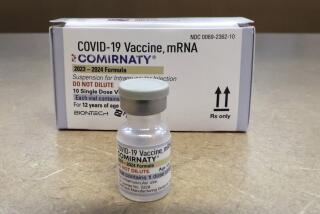Men, like women, should limit alcohol to 1 drink a day, expert panel says
- Share via
If you decide to have an alcoholic drink, limiting yourself to one a day is best — whether you’re a man or a woman.
That’s the new advice experts are recommending for the U.S. Dietary Guidelines for Americans, which are scheduled to be updated later this year for the first time in five years. The guidelines now say men should limit themselves to two drinks a day and that women should limit themselves to one. That advice has been in place since 1990.
In a report released Wednesday, a committee of experts noted there wasn’t adequate evidence to support different alcohol recommendations for men and women, and that research supports tightening the limit for men. U.S. health agencies that issue dietary guidelines aren’t required to adopt the committee’s recommendations.
“As a nation, our collective health would be better if people generally drank less,” said Dr. Timothy Naimi, an alcohol researcher at Boston University and one of the experts on the committee convened by federal officials.
The proposed advice shouldn’t be interpreted to mean that not having a drink on Thursday means you can have two on Friday, Naimi said. One drink is the equivalent of about one 12-ounce can of beer, a 5-ounce glass of wine or a shot of liquor.
This just in, and it’s definitive (for now): People who drink alcohol in moderation — especially older people, women and non-Latino white people — are less likely to die of any cause than are teetotalers or people who consume heavy doses of alcohol either on occasion or in an average week.
The advice is based on links that researchers observed between drinking habits and all causes of death, including heart disease, cancer and car accidents, rather than a specific physical harm that alcohol might have. Such observational studies, common in food and nutrition science, do not establish a cause-and-effect relationship but are often the best evidence available, so experts use them to give guidance.
With alcohol, Naimi said, two drinks a day were associated with an increased risk of death compared with one drink a day. He said the increase was modest but notable enough for the committee to recommend updating the advice.
Whether the proposed new advice would influence behavior isn’t clear. Many Americans already exceed the current advice on alcohol limits, Naimi noted. Still, he said most people could generally benefit from any reduction in alcohol, even if they’re not within the advised limits.
The report noted that the guidelines might be aspirational but were important for “stimulating thought around behavior change.”
The guidelines are based on the overall health of a population, and an individual’s risk from drinking can vary depending on a variety of factors and health habits, said Dr. Dariush Mozaffarian, a professor of nutrition at Tufts University.
Mozaffarian also noted that many people misinterpreted the current advice to mean they should have one or two drinks a day. The limits are meant for people who already drink. The guidelines say that people who do not drink should not start.
We Eat; Therefore, They Are
Even if most Americans aren’t familiar with the details of the U.S. Dietary Guidelines, they’re the subject of intense lobbying because of their power to shape the advice dispensed by doctors and what’s served in federal food programs, including school lunches.
Other changes recommended by the committee included tightening the limit on added sugars to less than 6% of calories, down from the previous limit of 10%. Federal officials are expected to issue the updated guidelines by the end of the year, after considering public comments and input from other agencies.






